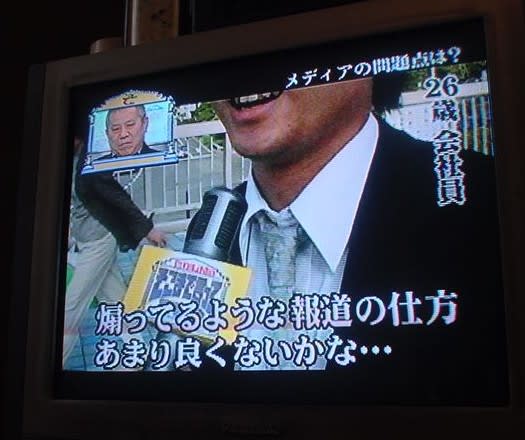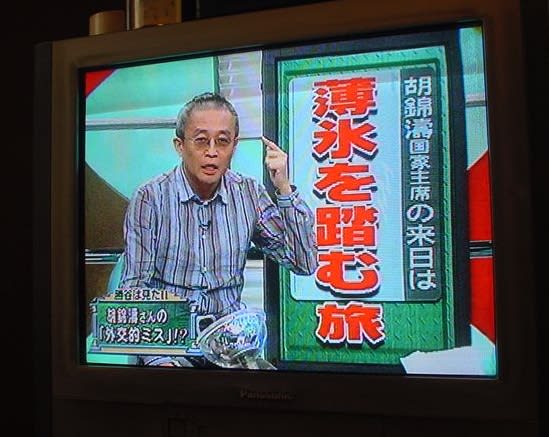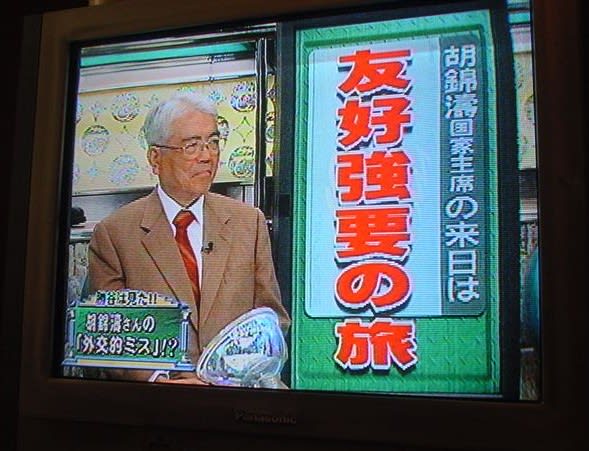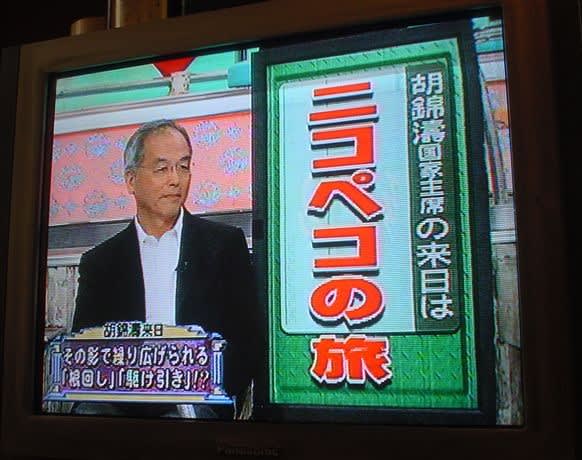<添付画像>:5月5日タイム誌・表紙より…
今、支那共産国家のプロパガンダに翻弄されている!
これで我国政府は地球世界規模の大恥をかいた。(いまだ国民が恥をかくところまでに至っていないが?そうならぬことを願っている…) なぜならば今、胡錦濤国家主席は我国日本を訪問している。 福田首相と共に「共同声明」を平成20年5月7日に発したものの、世界の国々が見守る中で「こどもだましの作文」をやらかしたものだから始末が悪い。
・世界規模の食料テロに匹敵する「毒入り餃子事件」は棚上げしたまま、
・東シナ海ガス田問題の確信に触れることなく、
・北京オリンピックとチベット問題もうやむやに、
・笑ってにこにこパンダを借り受け、
・我国天皇陛下主催の晩餐会に招かれた胡錦濤にして非礼にも平服にて天皇の側に臨席する『無礼』を(我国政府は)何も咎めず、
この度の共同声明は、支那共産国家の恥部に触れないよう配慮した福田風胡錦濤的万華鏡か?
嗚呼、馬鹿馬鹿しくも嘆かわしい、、、。
いやなに、タイム誌の先週号(5月5日付)のヘッドライン記事があるので(英語学習のために書取りし)切り抜いていた。 同記事によると、オリンピックトーチ運搬セレモニーに象徴されるか如く、今の支那大陸国内事情は「先の天安門事件」当時に匹敵するくらい混沌とし悪化する経済は崩壊寸前、多民族を包括した占領地(チベットを含む)の統治は19世紀風帝国主義模倣にて国家分裂の危機か。 経済格差に不満沸立ち暴発寸前となった「大衆の矛先」を、オリンピック篝火配送にかこつけてナショナリズム煽動に振り替えているから尚さら始末が悪い。
そんな時の胡錦濤国家主席の訪日である。
来る北京オリンピックの成功しか視野に入っていない(と、思える)支那共産主義国家元首を迎えた「のーてんき男・福田」は、今、何を、如何、考えているのか? 推測するに経済問題であるか。 隠された財政上の大問題を抱えているに違いない。
この先6ヵ月(平成20年12月迄)の時間経過の中、大きく変動する世界情勢と、責任感無き日本の政治家の動向を静かに見守りたい。
-------------------------------------------
"TIME Magazine" on Thursday, May 5th 2008.
Why China's Burning Mad
 Inflamed sentiments; details by (Time Asia com.)
A virulent nationalism sweeps the country as Chinese feel slighted ― by foreign media, pro-Tibet protesters, even France. Is this any way to welcome the world to the Olympics?
Inflamed sentiments; details by (Time Asia com.)
A virulent nationalism sweeps the country as Chinese feel slighted ― by foreign media, pro-Tibet protesters, even France. Is this any way to welcome the world to the Olympics?
By SIMON Elegant/ Beijing
Like all other foreign journalists in China, I get my share of criticism from Chinese readers, mostly about my stories on TIME's website or my posts on our China Blog. Some of the criticism can be pretty sharp--that comes with the territory. But the opprobrium has taken on a distinctly unpleasant edge in recent weeks as a wave of nationalist anger has roiled China. "Simon, you will be hated by 1.3 billion Chinese," someone wrote in response to my blog post about the chaotic progress of the Olympic torch through London. "Hope someday someone will spit on your face. Your name will be recorded in Chinese history book forever as one of cold blooded, Hitler-type, murder's assistant."
Overkill? Fellow foreign correspondents in Beijing have received much worse, including death threats credible enough to prompt some of them to move offices. The explosion of rage was initially sparked by what many Chinese perceive as biased international coverage of the bloody riots in Tibet on March 14 and the continuing crackdown by Chinese security forces that followed. Then, as the Olympic-torch relay was greeted by pro-Tibet demonstrations in London, Paris and San Francisco, many Chinese felt their national honor had been besmirched. Recently, their ire has been focused specifically on France. Over the weekend of April 19 and 20, thousands of anti-French demonstrators took to the streets in cities across China. They were apparently of the belief that French authorities had deliberately left security lax when the Olympic torch transited through Paris--out of a desire to humiliate China and interfere with Beijing's hosting of the 2008 Games. (Although the relay in London was similarly dogged by protests, the British have not been subject to such specific hostility.) The Paris city council poured oil on the flames by making the Dalai Lama an honorary citizen.
‘Your will be hated by 1.3 billion Chinese. Hope someday someone will spit on your face.’
― Anonymous bog post, responding to the writer’s commentary on TIME com.
The anti-French protesters are not simply a noisy, hysterical minority; many Chinese are deeply angry about what they see as a global conspiracy to blacken their nation's good name and ruin the Olympics. That makes for a perilous moment for a country that hoped to display its best side to the world this summer, and is now displaying something uglier. Chinese are immensely proud of what their country has achieved in the past two or three decades and of the prestige conferred by the Olympics. But many are still insecure about the permanence of China's new position in the world and haunted by memories of past humiliations by foreigners that have been drummed into them since childhood by a government increasingly dependent on nationalism for its legitimacy.
It's testament to the fever pitch of nationalism that even iconic figures can suddenly find themselves under attack. The Paralympic fencer Jin Jing became a national hero (dubbed "the wheelchair angel" by the Chinese media) for her attempts to protect the Olympic torch from pro-Tibet protesters in Paris. But after she questioned the wisdom of a call by some nationalists on the Internet to boycott the French retail giant Carrefour, Jin found herself the subject of Internet attacks branding her "unpatriotic" and a "traitor."
So, what explains the furor? The ferocity with which the protesters turn on anybody who disagrees with them reminds some older Chinese of the dark days of Mao Zedong's Cultural Revolution, which convulsed China from 1966 to '76. Today's protesters have one thing in common with Mao's revolutionaries: years of indoctrination in a highly nationalistic--some would say xenophobic--credo that imagines a hostile and perfidious world determined to undermine China. "Maybe kids today know more about computers, about the Internet," says Dai Qing, an environmental activist who was imprisoned after the 1989 Tiananmen Square massacre, "but when it comes to history, the education they get is the same."
The doctrine was reinforced after the Tiananmen protests. Deng Xiaoping, then China's leader, declared in a speech to the nation's military leadership that the cause of the unrest was that political education had been ignored. In the months and years that followed, the government created new textbooks that emphasized both the glories of Chinese culture and the century of humiliation at the hands of foreigners that began with the Opium War in 1839. That patriotic education extended beyond schools to include television, film and the news media. "Whenever there's a crisis, the same narrative of Chinese history emerges," says William Callahan, an expert on Chinese nationalism at the University of Manchester in the U.K. "Not just in the official statements but now in the popular responses as you saw in Tibet. [The Chinese say,] 'Foreigners can't intervene, because we were humiliated before.'"
Having effectively abandoned the Marxist-Leninist ideology that was once its bedrock, China's Communist Party now draws its mandate to govern from two sources--economic growth and nationalist pride. The trouble with nationalism, though, is that it's difficult to control. What starts as criticism of the foreign can quickly swing to domestic targets. One of modern China's defining events was the May 4, 1919, student protest, which began as an expression of nationalist ire over China's treatment by foreign powers in the run-up to the Versailles Treaty but then turned into an antigovernment movement. Could today's protests take a similar turn? Plenty of Chinese have grouses about their rulers. Huang Jing, a visiting China scholar at the National University of Singapore's East Asian Institute, says public dissatisfaction could spill over into issues ranging from soaring inflation, the plunging stock market and rampant official corruption. If the government "lets nationalism keep rising unchecked, it could suddenly find its own position threatened," Huang says.
An immediate risk is that China could still be awash in antiforeigner sentiment in August, when Beijing will welcome the world for the Olympic Games. It would take only a couple of instances of violence against foreigners to undo years of official campaigns to make the capital extra-hospitable--coaxing Beijingers to learn English and stop spitting in the streets, for example.
The danger isn't just domestic. Susan Shirk, an expert on Chinese politics at the University of California at San Diego and the author of the 2007 book China: Fragile Superpower, believes that the protests in China radically reduce the room Chinese leaders have to compromise when it comes to international issues. If Beijing is constantly under pressure to show its domestic audience that it is the dominant partner in foreign relations, "it will be difficult for China to go back to being a calm, cooperative, mature, responsible power," says Shirk.
This is an especially bad time for China to be showing a hostile face to the world. Polls indicate that China's international reputation has taken a beating recently. A Financial Times/Harris poll of Europeans revealed that China is considered the biggest threat to world stability, replacing the U.S. And a Zogby Interactive poll found that 70% of Americans surveyed believed that because of China's poor human-rights record, it was wrong to give the Games to Beijing.
Well aware of the dangers that uncontrolled nationalism poses both domestically and internationally, Beijing has already begun clamping down, with senior ministers appealing for calm on radio and television. Will angry Chinese calm down simply because their leaders tell them to? So far, Beijing has been spared the most visible displays of rage seen in secondary cities like Wuhan and Qingdao. But on April 19, a convoy of a dozen cars bearing banners condemning France and opposing Tibetan independence slowly cruised by the French school in Beijing, where students were inside taking exams. My children are at a different school, but the display still gave me the chills. With China's nationalist tiger untethered, a foreign journalist may have more to fear than angry messages on a blog.
With Reporting by Austin Ramzy / Beijing
(以上、タイム誌'08.年5月5日記事より抜粋)






































